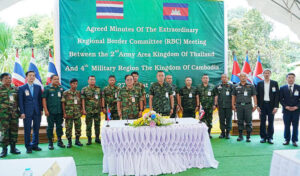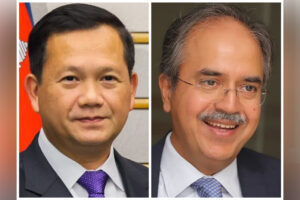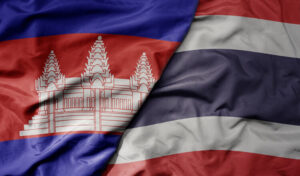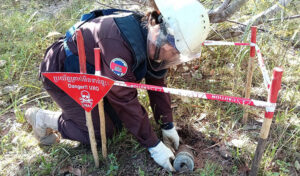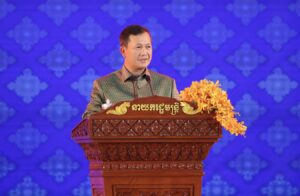Selected Comments of Samdech Thipadei Hun Manet, at the graduation ceremony of the Royal University of Law and Economics (RULE) [Unofficial translations]
[1]
(1) Together build human resource base for joint development
In every graduation, I always wanted to know how many of graduates were the first in their families to be bestowed with a post graduate degree. Do we have any in here? […] look, there are quite many […] sometimes, students come up (to receive diplomas from me were) over 60 years old. Asking (if they have any grandchildren, some said they already had) four grandchildren. Well, in the previous times, there was no opportunity for education. After the end of the war, they became the workforce for the country, especially those in the provinces. It was until later, when a university reopened, they had the opportunity to continue their studies. To continue one’s education is not a strange thing […]
It is a fact that the students themselves have to struggle, whereas the parents, the families are their strong supporters. In education there has another actor – professors, teachers […] who have participated in any parts to make life more knowledgeable, capable, for a stronger future […] I thank the University for providing scholarships to Samdech Techo through the committee of Samdech Techo and Samdech Kittipritthbandit Scholarships, which started from 2008, and it has been 16 years to date, where there are in all 1,563 scholarships. Today, 66 (scholarship students are) to receive their degrees […] this is to provide opportunities for young Cambodians and the Cambodian people at large to jointly build a human resource base for joint development […]
(2) Stability and peace, improved livelihood and participation of the private sector ensure the building of human resources
All of these opportunities guarantee access to education are possible thanks to a number of factors. The first factor is the stability and peace, which can give us the opportunity to stop fighting and to build an education system and connectivity. We not only connect the roads, or the curriculum, but also the classrooms. The other day I visited a program where many universities are connected online […] allowing online tutoring programs, using technology, to share and increase efficiency in education […]
Secondly, the improvement of people’s living standards. In addition to scholarships, most of you have (studied) in a fee-paying form. It is with improved living standard that one can ensure access to learning. With this means, the school has the opportunity to make additional investment to improve the education sector and improve the quality of education […]
Thirdly, the wide access to higher education through policies involving the private sector in education. Those who used to pass the baccalaureate in the 1990s know that there were not many schools at that time […] to offer opportunities for Cambodians everywhere, both quantitatively and qualitatively, the Royal Government has put in place policies to enable participation (from the private sector) to increase access (education) […]
(3) Education must be intertwined – “we are with the world and the world is with us”
The state must strengthen and expand in all areas from infrastructure, health, agriculture, trade to industry […] for which the state could not respond with sufficient resource expenditure in a timely manner […] therefore, (firstly) it is important to lay out policies for participation (of the private sector). Secondly, capacity building should not only expand in the country. we must expand relations with foreign countries, and encourage the participation of foreign higher education institutions to participate in our education efforts […] and, education must be interconnected. We cannot live behind closed doors. We are with the world and the world is with us. Once we shut the door, we cannot leave and they cannot enter […]
(4) Modernize and reform education systems and methods on a regular basis and be proactive.
These latest developments are a source of pride for all education systems. Asked if it was perfect? I would say – “no, not yet”. No education system in any country is perfect. They are constantly reforming (and editing their) teaching methods […] I would praise the Royal University of Law and Economics, as well as many other universities, that initiated practical actions to reform and modernize education regularly, and exchange experiences with partners […]
I am taking this opportunity to appreciate and evaluate efforts of the Ministry of Education, Youth and Sports to reform the education system and strengthen the education sector. The policy needed to be proactive […] if we are aware that our economy will be based on science, we have to embark on STEM and/or STEAM (in our education curriculum right away). We must have plan before starting proactive activities […] higher education policy adjustments have improved a lot, but it is important to intertwine adjustments from primary to higher education. Without a strong foundation in primary and secondary education, we would not have a strong foundation in higher education […]
(5) Increase investment budget for effective, efficient, and timely innovation education
Whether it was the Rectangular Strategy or the Pentagonal Strategy – Phase I, and subsequent phases to come, the Royal Government focuses on human resources (as its first priority). A country would be strong because of a strong population. In fact, in our national budget for 2020, our budget allocation for education was 3.2 billion Riels, or more than US$ 782 million. By 2024, we increased it to 3.7 billion Riels, equivalent to more than US$ 911 million […] the planned growing investment in (education) infrastructure for teachers covers many important issues […] whereas, human resources, or the people, must be the first to benefit. Therefore, until now, we will continue to invest in human resources policy in the education sector to achieve a more efficient, effective, and timely innovation […]
(6) Training of human resources in education, employment and in other institutions for capable national workforce
When it comes to education, let us think of school. Think about the school, we may think about the program and the facilities. And think about investing on purpose. Therefore, the preparation of programs for refresher teachers training, students and educational methods is an important task to reap the benefits. Asked why we care about education? Why does the state invest in the training of human resources in the field of education within the framework of the Ministry of Education, TVET within the framework of the Ministry of Labor and Vocational Training, and in addition, in other institutions such as even in the Ministry of Cult? […] it was for people to possess the self-sustaining ability to live and determine as the strength of the nation, the strength of the country in various forms […]
Firstly, knowledge increases people’s ability to compete. In the free market economy, in order to be able to compete or to seize the opportunity, everyone must have a high level of ability, knowledge and education, and that can be both experience and theory and practice. For a nation, when we have a large population, competitive knowledge will help our country compete […]
Secondly, knowledge and ability help people have the independence to determine the working life and daily life better. We can do a lot of things on our own […] life planning, leadership, implementation of life, hard work, whether you are a worker, a farmer, an officer, or an employee in the private sector, you need knowledge and ability to determine livelihood […] when we have the ability to do it, we say we own it […] independence gives ownership of self-determination to Cambodia through investment in education. Moving forwards stronger and faster […]
(7) Knowledge ensures resilience, which ensure ownership, and human resources is the resilience that needs to be strengthened
Education guarantees us resilience. It means that in way of a storm, we do not collapse and can recover thank to our inner knowledge […] it means that we hold on to independence. Should the storm come in hard, we may lose what is outside of us but what is inside us – idea, capacity, and knowledge allow us to seize the opportunity to rebuild. The same is true for a country. The war and the Pol Pot era are over […] as we ended the war 25 years ago, our economy was growing fast because of the human resource built in the 1980s. By 1998-1999, we had a lot of resources to develop the country […] we tried to restore the country but if there were no human resources, and if all sectors depended on human resources from outside, there would probably no one holding on to hardships. In such case, human resource is our resilience and something we need to strengthen […]
Our economy used to be dependent on the light textile and garment sector. Now, we are moving to the mid-range industry, machinery and electronics. Ability and experience available allowed us to upskill or reskill (our labor force) […] if we do not have schools, no universities to train human resources for (investors) to provide them a little more training, it would be difficult. Thus, human resources help us to be flexible and be able to seize new opportunities […] whether having a bachelor’s or master’s degree is the basis to be resilient, competitive, flexible, and adapting to seize new opportunities […] to help the country be resilient, developing, flexible and competitive with other countries in the world […]
(8) The RGC gives priority to people through health, capacity, job opportunities, reform of public administration and strengthening security and public order
The Royal Government of the 7th legislative term […] has given priority to people through (1) health, and capacity. We humans need these two key elements to grow. Secondly, it is the opportunity through job creation and promotion […] (3) public administration reform, mainly recruitment of officials […] internal institutional reform, whereas institutional strengthening depends on human resources, especially the initial recruitment and additional training for existing officials […] and (4) strengthening security and public order as a priority in the country. The war is over and we are involved in strengthening public order […] to help people maintain stability […] and I hope this Pchum Ben (holiday) people travel safely to avoid traffic accidents […]
(9) The Ministry of Justice reviews amendments to the Penal Code and the Code of Criminal Procedure to strengthen the enforcement of penalties for drunk driving
Phnom Penh Municipal Court announces its verdict in the Russey Keo (drunk-driving incident) […] saying that this is what has been set (according to the maximum level) that the law allows […] I am asking the Ministry of Justice to exercise its injunction authority to bring the case to the Court of Appeal for review whether the decision is serious enough […] this case affects many and is an example to other drunk drivers […] we cannot do anything beyond the limits of the law in force, but we need to see if the laws need to be amended to increase the weight (of penalty) to prevent this from happening again in the future […] the Ministry of Justice is reviewing and preparing to amend the Penal Code and the Code of Criminal Procedure. Therefore, they should consider inspecting articles that would ensure stability and reduce the (lethal) incidents, particularly, from drunk driving, etc. […]
[2]
(10) Continue to study and expand knowledge – “Learn for life, learn everywhere, learn from everyone and learn from yourself”
Continue to study at a higher level to expand your knowledge more widely, that is, to continue to study for life, learn everywhere, learn from everyone, and do not forget to learn from yourself, consider yourself as your own teacher […] once you are learning, you should learn 100%. But when you are going out to work, you have to work 120% to be successful. It means that you worked 100% on the job given, but you need to do the extra 20% to show your innovation […] and do not be an ice person. Be creative. Do your everyday work to be 100% successful and do not forget to research, create new methods, new ways to grow […]
[4]
(11) The government does not withdraw from the development goals of the four northeastern provinces
On September 20, 2024, the Royal Government announced the end of Cambodia’s participation in the Cambodia-Laos-Vietnam – Development Triangle Area (CLV-DTA). This project had been going on for 25 years […] one group of people said that by withdrawing Cambodia out of the CLV-DTA, “the government has failed, the government is no longer moving forward, and must be changed” […] let us see what is the main goal of CLV-DTA? If its big goal has reversed, then they can talk about that. The main goal of the CLV-DTA was – as part of a northeast development policy – to allow the most remote provinces to grow faster to connect with the other parts of the country. Asked if we have withdrawn from this goal? I would say “not at all”. The government is still developing the northeastern area, i.e. developing the four provinces still […]
There are three groups of people. One group wants to develop the area on our own. Another group wants to develop the area, but supports partnership in order to draw some resources, and leave the national resource to develop elsewhere. The third group of people, the silent majority, did not express their opinion on Facebook whether there should or should not be a DTA, but they just want (the RGC to ensure) – firstly, not to lose land, secondly, not to lose sovereignty, and thirdly, to develop the area. Those supporters and non-supporters of the CLV-DTA development triangle wanted the same thing as the third group – to defend the territory, defend sovereignty, promote more development in the area […]
We have now pulled out of that (CLV-DTA) project. We will work with partners in a different framework. Some asked (that we have made this decision,) who is losing and who is winning […] I am asking you to have an understanding […] when we (have) common interests, our concept is to achieve development, guarantee sovereignty, ensure our territory – it is not loss, plus we will ensure development of this northeastern provinces. It is our big goal. If we talk about which side lose or win, let me tell you that the whole Cambodian people, whether you support or not […] the whole Cambodian nation wins […]
(12) Ensuring Cambodian children go to all parts of the country to help defend the territory
My answer to the above question is no different to what I (said on the occasion of the meeting with) the wisemen/women – with or without the DTA, we must continue to play an important role in defending our sovereign territory and promoting the growth not only in the Northeast but also in the whole country. We must continue to demarcate the border by negotiating and finishing the mounting of border markers responsibly. We must continue to build the border ring road until we finish it […] for places like the dragon-tail-shape area, where most of the Cambodian children have never been reaching, and even the Indochina geographical group, had not reached in certain places, we need to build the road for people to live and to invest to ensure that the Cambodian children can go to all parts of our country to help defend the territory […]
(13) Have trade ports rather than closing border and sending the troops there
The word nationalism is a good thing, but do not be overly nationalistic, which can become extremist […] we are over (with the war). Together, let us maintain protection (of peace). Do not break the national unity […] the Royal Government responds and implements the principle of resolving people’s concerns, urging the erection of border posts, border road construction, border development, turning the border area into a border of solidarity, cooperation with neighboring countries, whereas people are the fence […] promote the development by opening trade ports rather than closing it and sending the troops there, demining along the border instead of laying more, and placing more cranes to build tall buildings rather than artillery lined up […]
Secondly, I would like to confirm that the visit (to the northern provinces and the border area) is to go on […] so that our people can see the real development, feel the warmth and help those from the plain area and others to get to know the northeastern province […] the Cambodian or local tourists can go visit the border to see if there are roads, border posts/markers, and judging themselves if there need to have fences […] in terms of tourism, let us not think just about tourists from outside the country. There are a lot of local tourists. People need to go for sightseeing too […] the tour group should think if there is a product for retirees around the country […] so that more Cambodians know more about Cambodia […]
(14) Determined to develop the northeast area, to protect the territory, to protect the sovereignty of Cambodia for the Cambodians for hundreds of years to come
(Those in the opposition may want) to shout that the Hun Manet government failed and collapsed, or ended, and they may drink for that […] but for Cambodia, we are still making a package to boost the investment economy in 2025 in the Northeast […] we do not back down […] I used to announce and we still do, with or without DTA, importantly, we are determined to continue to develop in that area, to protect the territory, to protect the sovereignty of Cambodia for the Cambodians for hundreds of years to come […] whereas CLMV is the mechanism of ASEAN, (it is naïve to have called for removal of Cambodia from it) […] and sooner Timor-Leste would also join […] Asked if all countries lose sovereignty? (They do not and have become) stronger, respectively. This CLMV is not dangerous and it is not wrong […]
Previously, they used (the CLV-DTA issue) to ignite people’s (misconception) […] they used it as a sword to cause people’s concerns all along. Now (that the RGC has moved Cambodia out of CLV-DTA), they have no such sword anymore. They may have their party and drink Soju, but all the bullets that caused people’s worrisome are out. As of now, the Cambodian people all over the country are united. Let us not worry about DTA anymore. Let us unite to develop the area together with other partners, in whatever way – the best possible. As we are now free from worries, the Cambodian people are united […]
Someone came out and said on TikTok that the government did not dare to withdraw from the CLV because it had to pay back money. According to the MOU among the three countries, anyone country has the right to withdraw (candidacy by) just notifying the other party through diplomatic means six months in advance. On the 20th (of September 2024), the Ministry of Foreign Affairs (and International Cooperation of Cambodia) already informed Laos and Vietnam […] it is our right. We do not owe anyone […] each country must respect each other’s sovereignty […] the issue of relations with countries around the world, what others think is their problems […] we must strengthen ourselves, and the start point is internal unity, national unity, not to be divided […] we may have disagreement but do not go to action leading to instability […]
(15) Gumball 3000 arrived in Malaysia, social media debate should end
Hopefully the Gumball story is over soon […] they are gone, and some people are still fighting (about it). This September 30, I will go to Chip Mong Company to receive more than US$ 400,000 from the Gumball event and give it to the Angkor Pediatrician Hospital. I would like to clarify that no one has a heart to despise our ancestors, and some people have already expressed opinions regarding, to their judgements, improper activities in the organization (of the event) […] you may express opinions, but do not have to fight each other. The Gumball3000 was here only two days, but in Cambodia, (there had been) debates for two weeks and is not over […] the battle should end on the airwaves or on Facebook. Both sides have their arguments, but if you want to win or lose, […] I would urge them to look around – they drove to Malaysia already. What are we still fighting for? […]
We are not perfect, but we have not lost our cultural values. Foreigners also respect our values. In terms of tourism and culture, we have done everything possible to protect. Some have already expressed their opinions. We have to take this as an experience to learn from for the next event. We have to take extra carefulness. I think everyone should be happy. We have already expressed our opinions and should end (this useless protracted exchanges) […] I say we should finish it and go to Pchum Ben. No need to have a loser and/or the winner regarding the CLV-DTA anymore. Let us find out how to develop the four provinces. (I urge people to) visit our border provinces and we are committed to build more roads (there) […]./.

